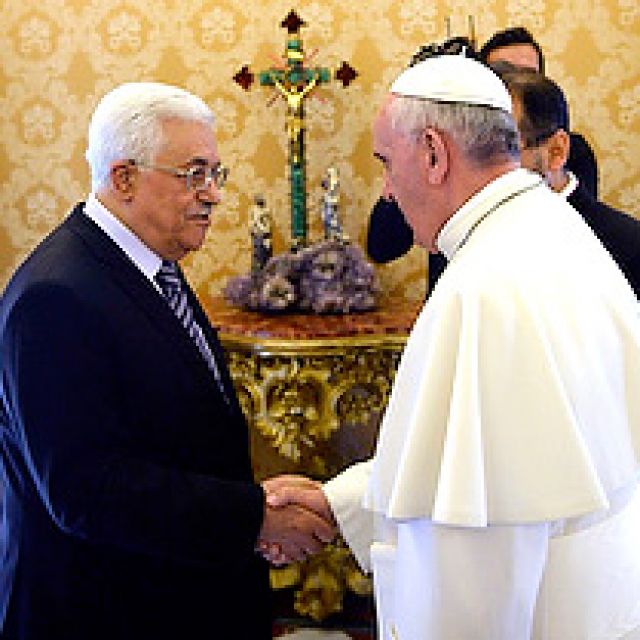The exchange took place Oct. 17 in the papal library after the pope and Palestinian president had spent almost half an hour meeting privately.
Abbas had given the pope a Bible and a framed scene of Bethlehem, West Bank. The pope gave Abbas a framed scene of the Vatican along with the pen, "because you obviously have many things to sign," which is when Abbas spoke about his hopes to sign a peace treaty.
A Vatican statement about Abbas' meeting with the pope and a later meeting with the Vatican foreign minister, Archbishop Dominique Mamberti, said, "The reinstatement of negotiations between Israelis and Palestinians" was a topic in both conversations.
"The parties expressed their hope that this process may bear fruit and enable a just and lasting solution to be found to the conflict," it said. "Hope was expressed that the parties to the conflict will make courageous and determined decisions in order to promote peace" and that the international community would support their efforts. The U.S.-mediated talks began in July.
The Vatican statement did not mention Pope Francis' possible trip to the Holy Land, although when Abbas greeted Archbishop Mamberti he told him that he had invited the pope to visit. Abbas' delegation also included the mayor of Bethlehem, which likely would be on the itinerary of a papal trip.
In April, Israeli President Shimon Peres also invited the pope, and Israeli media have been reporting that a papal visit is expected in the spring. Israeli Prime Minister Benjamin Netanyahu's office announced Oct. 16 that the prime minister would meet U.S. Secretary of State John Kerry in Rome Oct. 23 and meet the pope during the same trip.
The Vatican statement on Abbas' meetings said the pope and Palestinian leader also discussed the ongoing war in Syria and expressed their hopes that "dialogue and reconciliation may supplant the logic of violence as soon as possible."
The two also discussed the work underway on a Vatican-Palestinian agreement regulating "several essential aspects of the life and activity of the Catholic Church in Palestine," as well as the situation of Christian communities in the Palestinian territories and the contributions Christians make to society throughout the Middle East.


